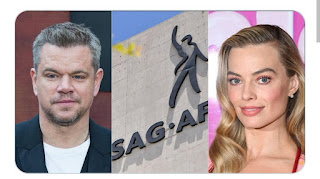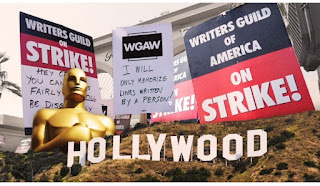— Movies & Shows are Paused and there are Fears A.I Will Replace Jobs.
— See Why Hollywood is on strike 👇
— See The Critical issues 👇
Disney, Netflix, Amazon Suffer More than 170,000 Hollywood actors and writers go on strike against studios including Disney, Netflix, Amazon and Sony.
Here’s a list of movies and shows affected by the strike:
— Beetlejuice 2 w/ Tim Burton and Michael Keaton
— Deadpool 3 w/ Ryan Reynolds and Hugh Jackman
— Gladiator 2 w/ Denzel Washington and Paul Mescal
— Juror #2 w/ Clint Eastwood - Lilo & Stitch by Disney
— Minecraft - Mission: Impossible
— Dead Reckoning Part Two w/ Tom Cruise
— Mortal Kombat 2
— Venom 3 w/ Tom Hardy A-lister actors such as George Clooney, Matt Damon, Robert Downey Jr, Emily Blunt, Margot Robbie, Florence Pugh, Jason Sudeikis and Susan Sarandon are among the stars supporting the strikes.
Christopher Nolan stated he will not produce any films during the strikes.
The strikers grievances included increased pay, guarantees of work, and most interestingly, assurances their work WON’T BE REPLACED BY A.I.
The studios argue that the unions' demands are unrealistic, given the challenges the entertainment industry faces, from streaming to fallout from the pandemic.
“This is the worst time in the world to add to that disruption,” - Disney's CEO.
The studios have vowed to "stand firm" in the face of the strike. Janice Min, an industry expert, stated “If this goes on for a long time, you will feel it across the whole internet.” Despite these warnings the unions have said that they are ready and willing to put up a fight for their members' rights and demands.
MY THOUGHTS —Mario Nawfal
While this is the first major strike in Hollywood since 1980, I don’t find it concerning. Worst case we might feel it for a while, but these things tend to work themselves out.
BUT, I have one MAJOR CONCERN HERE: Workers are already worried about A.I replacing their jobs, and the technology is barely getting started! A 2021 report by McKinsey found that up to 800 million jobs could be lost to automation by 2030. That same report also claims that 950 million new jobs could also be created in that period.
Former Presidential Candidate Andrew Yang argued that A.I could lead to a "massive wave of job displacement" that could leave millions of people without work. This could lead to increased poverty, inequality, and social unrest. If A.I’s benefits are not widely shared, and they don’t lead to more jobs, a dystopian future in which A.I essentially runs the world, dictating our lives and employing humans , would no longer be science fiction. This will lead to even more inequality and centralization of power among people and organizations who control those A.I programs.
I do not see civilization accepting such a world, meaning mass unrest is inevitable unless a solution is implemented, and implemented FAST. This is one reason total figures in the A.I space, including
@elonmusk, are calling for regulation to move faster.
I’m optimistic, but very cautiously optimistic. I’m just surprised not enough people are treating this matter seriously. Am I alone in sharing this concern?
ARE YOU MORE WORRIED ABOUT YOUR MOVIES OR NETFLIX BEING DELAYED, OR YOUR JOB BEING REPLACED BY A.I — @MarioNawfal
Why Hollywood is on strike
Hollywood actors are on strike, demanding better compensation and benefits from major entertainment companies like Disney, Netflix, and Amazon.
The strike has brought together the Screen Actors Guild – American Federation of Television and Radio Artists (SAG-AFTRA) and The Writers Guild of America, who haven’t joined forces in 63 years.
The actors’ demands focus on fair profit-sharing and protection of their rights in the age of streaming and artificial intelligence. The strike has gained support from A-list celebrities and disrupted Hollywood productions.
In a seismic turn of events, the Hollywood film industry has been brought to a screeching halt as a staggering 160,000 Hollywood actors collectively initiated a strike.
This historic move comes as a resolute response to entertainment giants Disney, Netflix, and Amazon, with the actors demanding improved compensation and benefits.
With the Hollywood industry boasting a staggering worth of $42.5 billion, according to Zippa, the ramifications of this strike reverberate far and wide.
What makes this strike even more remarkable is the unity it has fostered between two prestigious unions that have not joined forces for 63 years: the Screen Actors Guild – American Federation of Television and Radio Artists (SAG-AFTRA) and The Writers Guild of America.
The last time such a massive strike took place was back in 1960, underscoring the gravity of the current situation. Notably, the Writers Guild has already been on strike for an impressive 11 weeks, amplifying the urgency of the matter.
The Critical issues
At the heart of this ongoing strike lies a series of failed attempts to negotiate payment agreements between the two unions and the Alliance of Motion Picture and Television Producers (AMPTP), the representative body for major film studios including Disney, Netflix, and Fox.
Reports suggest that the crux of the issue revolves around the pursuit of a more equitable distribution of profits generated from movies and television shows.
This becomes even more pressing in an age where streaming services and artificial intelligence have fundamentally altered the landscape, disrupting the traditional income streams for countless actors and writers.
While actors and writers are compensated upfront for their creative efforts, the lion’s share of their earnings is derived from residual revenue generated through ongoing broadcasts and showings.
Consequently, the failure of initial talks stemmed from the desire to establish a more “equitable” profit-sharing model, as well as bolstered protection for the rights of creators in the realm of Artificial Intelligence.
The strike’s main objective, according to a SAG-AFRTA statement published on their website, is to address the severe erosion of compensation over the past decade due to the rise of the streaming ecosystem.
Additionally, the advent of artificial intelligence poses an existential threat to creative professions, leading to a pressing need to safeguard the interests of actors and writers.
The union has expressed its concerns during a press conference, shedding light on a “groundbreaking” AI proposal presented by the AMPTP.
This proposal suggests that background performers could be scanned, paid for a day’s work, and have their likeness and image owned by the companies, allowing the use of their digital replica for eternity on any project without consent or compensation.
The union has vehemently opposed this proposal, challenging its fairness and far-reaching implications.
In response to the union’s claims, the AMPTP has refuted their contentions, stating that the proposal only permits the use of a background actor’s digital replica specifically in the motion picture for which they were employed.
For any other use, the background actor’s consent is required, and negotiations for such use would be subject to a minimum payment, thereby ensuring some level of protection and compensation for the actors.
Despite the contentious nature of the discussions, the union has made it clear that the ongoing strike is not directed at the production studios themselves.
Rather, it is seen as a crucial measure to safeguard the future earning power of actors and writers against the impacts of inflation, with the demand for higher pay being a central aspect of their struggle.
Reactions to the strike
The Hollywood strike has sparked considerable attention and support from A-list celebrities, lending their star power to the cause.
A SAG-AFTRA letter expressing a willingness to strike was signed by heavyweight names like Meryl Streep, Jennifer Lawrence, Charlize Theron, Joaquin Phoenix, Jamie Lee Curtis, Olivia Wilde, and Ewan McGregor, underscoring the potential impact of the strike.
Renowned actor George Clooney also joined the movement, emphasizing the necessity for change in the industry’s survival.
Notable figures like John Cusack and Mark Ruffalo have recently shown their solidarity, leaving no room for holdouts among US actors.
The reactions on social media have been diverse, with individuals expressing their thoughts on the industry’s distorted perceptions and the struggles faced by working actors and writers.
The strike has ignited a broader conversation about the financial realities of those involved in Hollywood, challenging the curated perception of glamour and wealth associated with the industry.
The ripple effects of this Hollywood strike have already been felt, as production across the industry has suffered due to actors walking offsets.
High-profile projects, such as sequels to Avatar, Deadpool 3, and Gladiator, have been put on hold, impacting not only studios but also audiences eagerly anticipating these releases.
Even prestigious events like the Emmy Awards, television’s version of the Oscars, are contemplating a delay from its scheduled September 18 date to November or even next year.
Furthermore, the strike may affect the US premiere of a major film scheduled to take place in New York on Monday.
As the strike enters a critical phase, all parties involved closely monitor the unfolding developments, awaiting a resolution to this unprecedented impasse.
Audiences, studios, and the creative workforce anxiously anticipate the outcome, as the future of the Hollywood film industry hangs in the balance.
Buy Luxury Apartments on the Island, Lagos







0 Comments